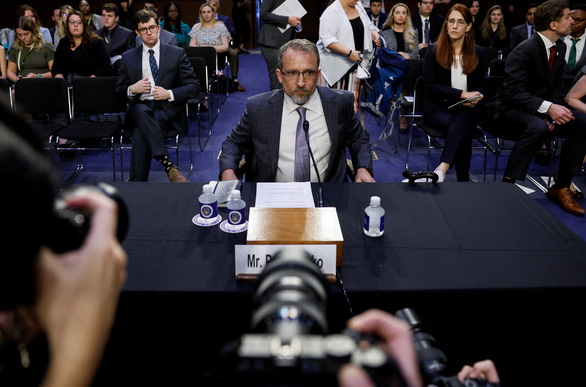What we put online will never be lost?
- Tram Ho

Peiter Zatko, the former chief security officer of Twitter, testified to the US Senate Committee on September 13. He was called a “whistleblower” by the media because of his warning to benefit society – Photo: REUTERS
Peiter Zatko, Twitter’s former chief of security, told the US Senate committee that the social network did not actually delete the data of users who had canceled their accounts. This information builds on allegations made by Peiter Zatko in the whistleblower complaint first reported by CNN and published by The Washington Post last month.
Mr. Zatko accused Twitter of not deleting users’ data after they deleted their accounts. Twitter countered, saying that the former security chief had drawn a “false story” about the company. In response to a question from CNN , Twitter said it had a process to delete data but did not disclose whether it completed that process.
While Zatko’s public accusations are startling, they’re just another reminder to users that we should be more careful about sharing data online.
Sandra Matz, a social media researcher and professor at Columbia Business School (USA), warns: “It sounds very simple, but what you’ve already posted online should never be expected. it becomes private”.
In July of this year, Meta – the parent company of Facebook – allegedly provided messages sent via Messenger to accuse a Nebraska teenager of having an illegal abortion. There is no indication that any of the messages in this case have been deleted.
Ravi Sen, a cybersecurity researcher and professor at Texas A&M University (USA), said law enforcement and other security groups have the resources and access to anything they use. want, including recovering deleted data in some cases when necessary.
Mr. Sen asserted that many people are not aware of this. Any form of information, whether it’s emails, social media comments, or direct messages, is typically stored on users’ devices, recipients’ devices, and company-owned servers. have the platform that you used.
“Usually, if a user has created content and deletes it, the content disappears from all three locations. But sometimes it’s much more complicated,” explains Mr. Sen.
“However, you can contact the companies and ask them to delete your data from their servers, although many people don’t actually do this step,” added Mr. Sen. Of course, the chances of recovering deleted messages from a user’s device decrease over time.
According to privacy experts, the best way to take control of your data online is to use apps that offer end-to-end encryption. It’s important to manage cloud backup settings to ensure that private data from encrypted services remains inaccessible elsewhere.
“But even with all the precautions an individual can take, once you put something online, you’ve essentially lost control,” Matz stressed.
“Because even if Twitter now deletes the post, or you delete it from Facebook, someone could have copied the picture you posted, by taking a screenshot or recording it,” Matz explained.
The Columbia professor also advised people to be more mindful of what they share on online platforms.
“Keep in mind that everything you share there can be used by anyone, and will last forever,” Ms. Matz reminds.
Source : Genk
